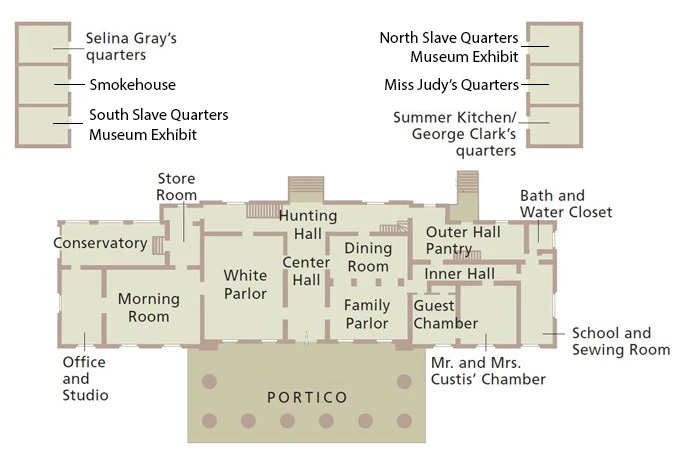Never Free
Aunt Judy, an elderly enslaved woman,lived in this room. Born at Mount Vernon, Judy was considered a “dower slave,” meaning she belonged to Martha Washington’s first husband’s estate. While George Washington freed his slaves in his will, he could not legally free the dower slaves. George Washington Parke Custis inherited Judy and brought her to Arlington House. Here, she may have worked as Mary Lee’s nurse. When she died in 1855, Judy was around 76 years old.
Christopher Sheels, who may have been Judy’s brother, was present at George Washington’s deathbed. Washington freed his slaves in his will, but he could not legally free Judy or Christopher.
“She could not see why so much fuss was made over ‘the genl, he was only a man!,’…she didn’t suppose he was so much better than anyone else”–Agnes Lee, daughter of Robert E. Lee, recalling Judy’s opinion of George Washington, March 23, 1856
“Aunt” Judy
Words and symbols have historic uses we may not realize. During slavery, slaveholders and the African American community often used familial terms like “Uncle” and “Aunt” to identify enslaved elders.These terms are still used today in ways some consider offensive, but others endearing. When we dig into the roots of terms like Uncle Tom or Uncle Remus, we broaden our understanding.
Freedom of Religion
Despite the struggles of slavery, the enslaved community forged their own traditions and family bonds. Religion could give enslaved individuals strength in the face of bondage. Enslaved workers attended Episcopal services in the mansion, although many preferred their own faith. They held their own Baptist services at a chapel on the southern end of the estate. Couples were married in religious services and formed families, even though the ceremonies were not legally binding.
“After reading to her in the Bible & a few hymns I asked her about the state of religion among the servants at Arlington. She said to my astonishment that many of them were members of the Baptist communion, but, none of them members of the Episcopal Church– that they had preaching & exhortation among themselves at home in the morning.”–Markie Williams, cousin of Mary Lee, on her conversation with Marsellina, an enslaved girl
Different Perspectives
The Lees supported gradual emancipation and believed that the enslaved benefited from slavery.
“The servants here have been so long accustomed to do little or nothing that they cannot be convinced of the necessity now of exerting themselves to accomplish the conditions of the will which the sooner they do the sooner they will be entitled to their freedom.”–Mary Custis Lee, February 17, 1858
“The painful discipline they are undergoing is necessary for their instruction as a race, & I hope will prepare & lead them to better things.”–Robert E. Lee, December 27, 1856
Some of the enslaved resisted the Lees and experienced the consequences.
“...Dick Williams, a county constable was called in, who gave us the number of lashes ordered; Gen. Lee, in the meantime, stood by and frequently enjoined Williams to ‘lay it on well,’ an injunction which he did not fail to heed…”–Wesley Norris, April 14, 1866

